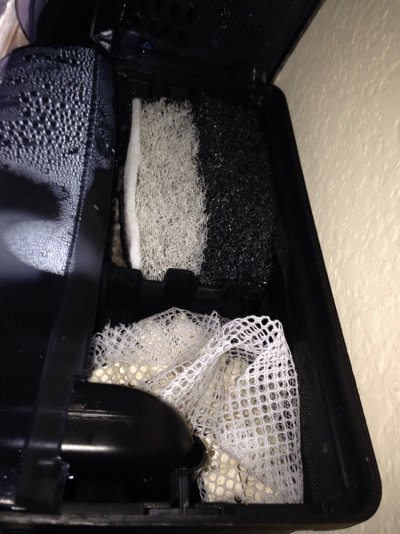fireman731
Aquarium Advice Activist
I understand this has probably been beaten like a dead horse and there are many aspects and opinions to it, BUT I wanted to reach out with more specifics to my situation and get a feel for what others opinions are on my situation.
Specs;
28 gal bow front
Sand/gravel substrate
Lightly planted with Java ferns, water wisteria, and amazon swords.
Use root tabs and dose flourish and excel
I have a dual t5 (14w each) and a single t8 (17w?) totaling 45 watts divided by 28 would be about 1.6 WPG.
Keeps around 80 degrees. PH is about 8.3 and water is kinda hard.
Fish;
6 black skirts
6 neons
6 Cory's
And a bristle nose pleco about 5"
Filtration;
I run 2 of the marineland HOBs, sized for 30 gals each at 150 GPH. Totaling 300 GPH turnover.
In the filter I run coarse sponge, fine sponge, a 100 micron felt polishing pad, purigen and a bag of bio max.
With about 10 gal PWC a week about 40% m nitrates usually hand around 10 PPM.
Would you say I am at the stocking limit? Would this latest addition of the second filter creat more biological surface area and increase the bio capacity for small, light load fish such as neons and the like?
Sent from my iPhone using Aquarium Advice
Specs;
28 gal bow front
Sand/gravel substrate
Lightly planted with Java ferns, water wisteria, and amazon swords.
Use root tabs and dose flourish and excel
I have a dual t5 (14w each) and a single t8 (17w?) totaling 45 watts divided by 28 would be about 1.6 WPG.
Keeps around 80 degrees. PH is about 8.3 and water is kinda hard.
Fish;
6 black skirts
6 neons
6 Cory's
And a bristle nose pleco about 5"
Filtration;
I run 2 of the marineland HOBs, sized for 30 gals each at 150 GPH. Totaling 300 GPH turnover.
In the filter I run coarse sponge, fine sponge, a 100 micron felt polishing pad, purigen and a bag of bio max.
With about 10 gal PWC a week about 40% m nitrates usually hand around 10 PPM.
Would you say I am at the stocking limit? Would this latest addition of the second filter creat more biological surface area and increase the bio capacity for small, light load fish such as neons and the like?
Sent from my iPhone using Aquarium Advice

